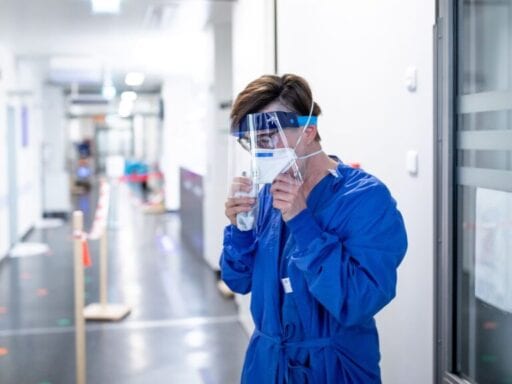Tech giants have committed to providing 9 million masks. It’s not nearly enough.
Silicon Valley is directing millions of masks to the front lines of the coronavirus pandemic to help address the shortage of medical supplies. It’s another way in which tech companies are trying to use their untapped resources to fill the void left by the government.
American tech giants from Apple to Facebook have in recent days announced attempts to collect and donate at least 9 million protective masks that medical workers in hospitals sorely need to treat infected patients. The mask shortage has been a major hurdle for containing the coronavirus, requiring some doctors and nurses to either reuse gear or to make their own alternatives, which can expose them to the virus and hasten its spread. Some doctors have gone so far as to beg on social media for these supplies.
Tech companies are obviously not in the mask-production business. But because of either coincidence or access to certain supply chains, they are in a position to share the equipment in a way that the government seemingly cannot. Details are still scarce on how exactly these companies have access to these masks, but a company like Apple has supply relationships around the globe that the federal government may lack. There simply isn’t enough global mask production for the current demand, and the Trump administration has been reluctant to use the law to require companies to produce more masks.
But there is a risk in relying on corporate philanthropy — rather than the government — in solving this problem. For starters, it depends on the voluntary generosity of these companies to deal with an unprecedented emergency, an altruism that could vanish at any time. These companies are also not accountable to American voters, only theoretically to shareholders. And they also are not always transparent about what exactly they are doing and on what time frame.
These public commitments have prompted friendly headlines for tech companies that may have forgotten lately what it feels like to receive positive coverage. And that’s why some on the left, such as Bernie Sanders adviser David Sirota, see the mask donations as a distraction from companies’ otherwise poor corporate citizenship.
Let’s all celebrate the altruism of Apple, which is worth $1 trillion, avoided $40 billion in taxes, and moved $250 billion to Jersey, a tiny tax haven island https://t.co/xcbBD06lDA pic.twitter.com/l4VimbFLuq
— David Sirota (@davidsirota) March 22, 2020
Plus, even 9 million masks are not enough. The White House has said that it has ordered “hundreds of millions” of N95 masks, the gold standard of personal protective equipment. One hospital at the center of the outbreak, New York City’s Presbyterian Hospital, said in an internal memo that it was burning through about 40,000 masks a day — and anticipated that rate to increase to 70,000 per day. So just this one hospital would go through the Silicon Valley stockpile in six months.
The largest commitment from a US tech company came from Salesforce, whose CEO, Marc Benioff, said on Twitter that he was hoping to deliver 5 million masks this week by “working hard across all of our resources & relationships.” Salesforce didn’t immediately respond to a request for comment on any additional details.
Apple has committed to supplying at least 3 million masks, although CEO Tim Cook has only referred to an unspecified “millions” of masks for the United States and Europe. Vice President Mike Pence said over the weekend that the company had “directly” pledged to send 2 million masks around the country, while California governor Gavin Newsom said the company had pledged another 1 million to him specifically for California. Apple didn’t immediately respond to a request for comment confirming the 3 million number.
Cook’s tweet implied that the company did not have access to the masks right now, but was calling upon the company’s relationships with suppliers, especially in China. Apple was “working to help source supplies for healthcare providers,” Cook said.
Facebook was the most forthcoming with how it happened upon its own masks. Mark Zuckerberg said his company had an emergency reservoir of 720,000 masks that the company acquired during the Bay Area wildfires. Facebook is also at work “sourcing a lot more to donate,” he said.
Elon Musk, the CEO of Tesla and SpaceX, has been among the few public skeptics in his industry of the seriousness of the coronavirus pandemic, but even he has begun distributing around 250,000 masks to hospitals, he has said.
And Flexport, an international shipping startup, has secured and donated about 60,000 masks to San Francisco, according to the city’s mayor, London Breed.
More masks will obviously help the medical professionals combating the virus. But because the masks go quickly, the real breakthrough needed is helping the American government secure a replenishing supply — especially because the need from hospital workers is not going away anytime soon.
Author: Theodore Schleifer
Read More



